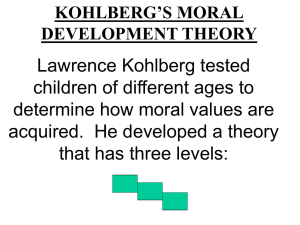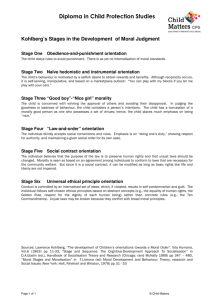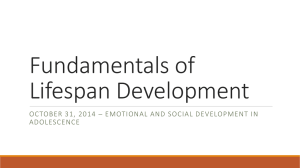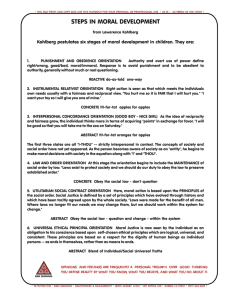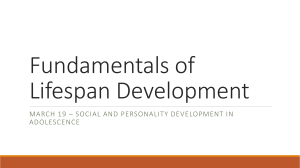Lawrence Kohlberg and moral development
advertisement
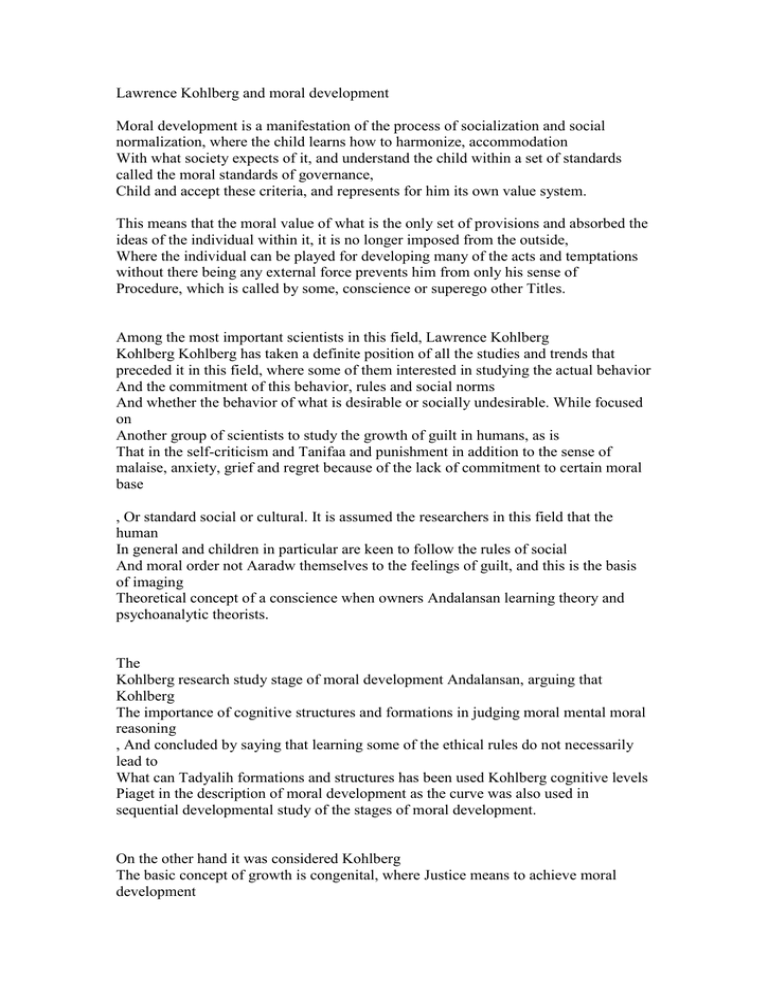
Lawrence Kohlberg and moral development Moral development is a manifestation of the process of socialization and social normalization, where the child learns how to harmonize, accommodation With what society expects of it, and understand the child within a set of standards called the moral standards of governance, Child and accept these criteria, and represents for him its own value system. This means that the moral value of what is the only set of provisions and absorbed the ideas of the individual within it, it is no longer imposed from the outside, Where the individual can be played for developing many of the acts and temptations without there being any external force prevents him from only his sense of Procedure, which is called by some, conscience or superego other Titles. Among the most important scientists in this field, Lawrence Kohlberg Kohlberg Kohlberg has taken a definite position of all the studies and trends that preceded it in this field, where some of them interested in studying the actual behavior And the commitment of this behavior, rules and social norms And whether the behavior of what is desirable or socially undesirable. While focused on Another group of scientists to study the growth of guilt in humans, as is That in the self-criticism and Tanifaa and punishment in addition to the sense of malaise, anxiety, grief and regret because of the lack of commitment to certain moral base , Or standard social or cultural. It is assumed the researchers in this field that the human In general and children in particular are keen to follow the rules of social And moral order not Aaradw themselves to the feelings of guilt, and this is the basis of imaging Theoretical concept of a conscience when owners Andalansan learning theory and psychoanalytic theorists. The Kohlberg research study stage of moral development Andalansan, arguing that Kohlberg The importance of cognitive structures and formations in judging moral mental moral reasoning , And concluded by saying that learning some of the ethical rules do not necessarily lead to What can Tadyalih formations and structures has been used Kohlberg cognitive levels Piaget in the description of moral development as the curve was also used in sequential developmental study of the stages of moral development. On the other hand it was considered Kohlberg The basic concept of growth is congenital, where Justice means to achieve moral development Social equilibrium between the members of the community by balancing the rights of individuals And duties within the framework of the principles governing the interactions Kohlberg sees the human and the indoctrination that by imposing on the young adult does not lead to Moral development in children, but which leads to the moral development of the reasons is the interest of the child, which was set up For which various social institutions and functions that Tudia these institutions where the interaction Between the child and his peers when they talk about roles and social institutions in the scope of their environments. Stages of moral development in Kohlberg Kohlberg believes that it is necessary to understand the meaning of stage in moral development is developed in the framework of the eight stages in the personal , And as the moral development depends on the mental and cognitive development, any rule issued by the congenital human must have a knowledge base that there is any Correlation between chronological age and level of the individual cognitive and moral judgments. Kohlberg believes in the existence of three levels of government are congenital in: 1 - the level before the custom and the law: a level most of the children before the age of nine, as well as some adolescents and some juvenile delinquents. 2 - the level of custom and law: the level of most adolescents and adults in the community. 3 - level after the custom and the law: is the level at which Aisalalih few adults. Means Custom and law to keep pace with society's rules and expectations, traditions and laws and adhere to , And this is accepted by the community itself, but the children are not aware of this in The early years. The individuals on the third level they understand the rules and expectations, laws, and when these conflict with the general principles, they are issuing their rulings in accordance with the principles and not according to custom or law. The following table shows the stages set by Kohlberg congenital growth from the perspective of social Kohlberg has developed a set of umpires ethical behavior are summarized in: Ethical behavior must be preceded by virtue of my values. Moral judgments have priority over the value judgments Ethical behavior and governance associated with congenital self-governing Moral judgments are usually based on reasons that are not outputs Moral judgments are objectively from the standpoint of the owner, a general provisions. Kohlberg and concluded that there were three categories of congenital allow governance, namely: 1 - the method and style of governance and moral Mahkat Aier and issued by a government congenita A - True B - with rights and duties C - to be equal to the commitment D - praise and blame E - reward and punishment And - means of virtue and good G - the justification and clarification 2 - principles of governance congenita and contain elements of governance and evaluation related to governance, a commitment to congenital defects or value: A - consider the consequences for the rule positive or negative (acceptable / unacceptable). B - output (positive / negative) for others. C - respect - freedom - justice and equality - common interests and mutual. 3 - content of the provision congenita and includes the topics included in the government, such as congenital: A - social norms written (laws) and the unwritten traditions) B - profile of conscience (self Alloamh) C - personal behavior and conscience D - leadership and management roles E - personal freedom and the right to life And - the presence of behavior and confidence in it and its effectiveness in Altaam with others G - justice laws (reward and punishment) in the areas of public life H - productive roles I - social control. Z - basic roles. K - renderings and specialized human skills and how to take advantage of them. Stations assessing human behavior: A - just reward. B - fair punishment. T - The right to life. W - The right to private property. C - honesty in transactions and the various civil rights in social life. H - Justice as freedom. X - justice as equality. D - Justice as a (common interests) the rights and duties. 4 - levels and stages of moral development: A - Level I: Pre-custom and tradition and is to undergo ethics and morals of selfishness. B - Second level: the rule of custom, traditions and expectations include participation of the social system. T - Level Three: Post-custom and traditions and includes ethical principles such as social contract ethics, morals and general principles.
